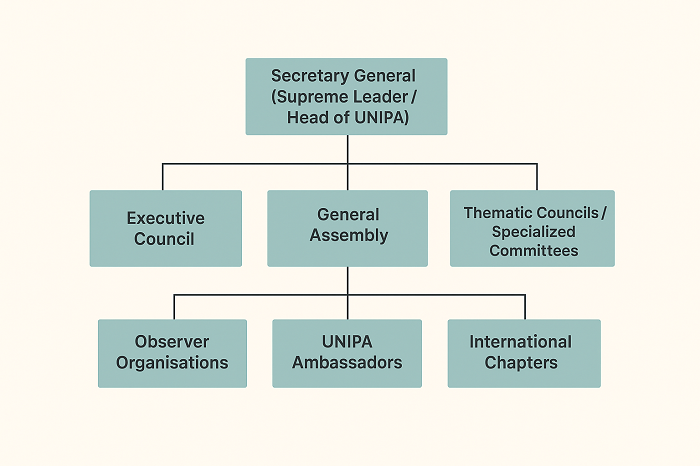- Who We Are
- History & Background of UNIPA
- Legacy & Leadership
- Our Mission & Vision
- UNIPA Constitution
- Aims & Objectives
- UNIPA- Organizational Structure
- UNIPA Flag
- UNIPA Anthem
- UNIPA Headquarters
- Legal Status & Accreditation
- Become a UNIPA Ambassador
- List of UNIPA Ambassadors
- UNIPA Excellence Awards
- Leadership Team
- Country Chapters
- Partners & Networks
UNIPA- Organizational Structure

Secretary-General (Supreme Leader):
The ultimate authority and visionary head of UNIPA. All councils, assemblies, and chapters operate under his guidance and approval. No resolution or policy is effective without his consent.
Executive Council:
Implements the directives and policies approved by the Secretary-General. It manages organizational functions, administration, and coordination among UNIPA bodies.
General Assembly:
Serves as a deliberative forum where proposals, policies, and initiatives are discussed and voted upon. Final decisions, however, rest with the Secretary-General.
UNIPA Ambassadors
Representation:
Represent UNIPA in their respective countries, regions, or institutions, promoting its vision, mission, and values.Advocacy:
Advocate for international peace, cooperation, and sustainable development in alignment with UNIPA’s objectives.Networking:
Build strong relationships with governments, organizations, and civil society to enhance UNIPA’s global partnerships.Project Initiatives:
Identify, initiate, and support projects or programs that contribute to peacebuilding, education, and community development.Reporting & Communication:
Maintain regular communication with the UNIPA Secretariat or General Assembly, providing updates, reports, and feedback from the field.Event Participation:
Represent UNIPA in international conferences, forums, and diplomatic events to strengthen global visibility.
Thematic Councils / Specialized Committees:
Specialized bodies focusing on core areas of action, such as:
Human Rights Council
Sustainable Development Committee
Youth & Education Commission
Peacebuilding & Mediation Forum
Climate & Environmental Justice Panel
Key Functions:
Research, policy recommendations, and advocacy
Project design and implementation within thematic areas
International Chapters:
Official branches of UNIPA in different countries or regions.
May have their own local structure, while aligned with UNIPA’s central vision and policies.
Engage in local partnerships, grassroots work, and regional advocacy. UNIPA’s presence across countries and regions. Each chapter represents UNIPA’s global mission locally, working in harmony with the Executive Council and under the leadership of the Secretary-General.
Secretariat
The administrative and operational arm of UNIPA.
Headed by the Secretary-General.
Composed of permanent staff and appointed professionals.
Key Functions:
Strategic planning and coordination
Communications and media
Documentation, logistics, and event organization
Council of Advisors
A diverse body of senior experts, scholars, global leaders, and civil society actors.
Appointed to provide strategic guidance and international credibility.
Observer Organizations / Partner Networks
NGOs, academic institutions, or multilateral bodies granted observer status.
Collaborate with UNIPA without holding voting rights.

